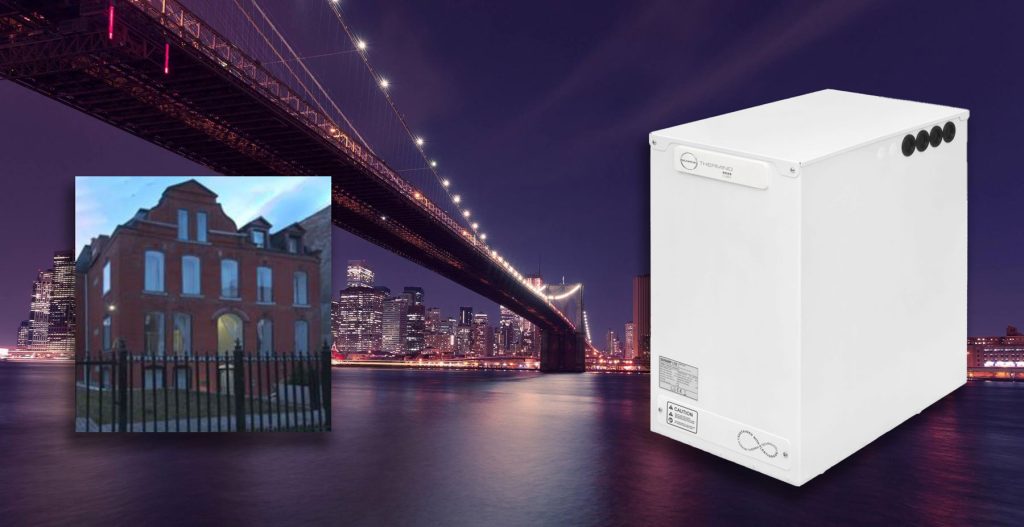Project Overview:
A prime example of this initiative is a space-constrained studio apartment in Brooklyn, NYC, where Sunamp’s advanced Thermino thermal battery solution replaced a traditional gas-fired combi boiler. The integration of this modern thermal storage system provides both hot water and space heating, significantly improving the apartment’s energy efficiency and resilience. This project showcases the potential for cutting-edge technology to help reduce carbon footprints while maximizing energy performance in compact urban settings.
Problems to be addressed:
The studio apartment in Brooklyn, NYC, previously relied on an outdated gas-fired wall-mounted boiler to provide both hot water and heating. As is common in many older buildings, this system struggled to meet modern sustainability standards and energy efficiency requirements. The reliance on fossil fuels not only contributed to higher energy costs but also limited the apartment’s ability to reduce its carbon footprint. Upgrading to a more sustainable solution was essential to improving both energy performance and environmental impact.
Existing System Overview:
The apartment’s existing fossil fuel-fired wall-mounted boiler was responsible for both hot water and heating. As a traditional, energy-intensive system, it relied on natural gas, contributing to higher operational costs and increased greenhouse gas emissions. This outdated boiler system did not align with modern energy efficiency goals or sustainability standards, making it a key target for upgrade in the quest for a more environmentally friendly and cost-effective solution.
The Sunamp Solution:
A Sunamp Thermino 80i (P58) thermal battery was installed, paired with an integrated 2.8 kW electrical resistance heating element to provide a highly efficient solution for both space heating and domestic hot water. The Thermino thermal battery serves a dual function, storing energy to keep the apartment comfortable throughout the year while dramatically reducing reliance on fossil fuels. This innovative system ensures consistent energy availability without the environmental impact of traditional gas-based systems.
To optimize energy costs, charging of the thermal battery was scheduled during off-peak hours, specifically between 18:00 and 06:00, taking advantage of time-of-use tariffs for lower electricity rates. This strategic approach enhances the system’s cost-efficiency while promoting sustainability.
Results and Findings
Impact & Conclusion: Enhancing Energy Efficiency and Sustainability
Cutting Emissions:
By eliminating the need for a gas-fired boiler, the Thermino thermal battery significantly reduced the apartment’s greenhouse gas emissions. The carbon emissions associated with electricity generation are 32% lower than those from natural gas combustion, marking a key step in reducing the home’s carbon footprint and supporting a more sustainable energy future.
Grid Flexibility & Load Shifting:
Pairing the thermal battery with a smart control system enables load shifting, optimizing energy consumption based on off-peak electricity tariffs. This not only offers cost savings but also holds significant potential for reducing peak demand and enhancing grid resilience. By managing energy use more efficiently, this system contributes to a more flexible energy grid, reducing strain during periods of high demand and improving overall energy system stability.
NYSERDA NEXTGEN Building Innovation Program:
The NYSERDA (New York State Energy Research & Development Authority) NEXTGEN Building Innovation program aims to help New York State achieve a carbon-neutral economy by 2050, with a goal of reducing greenhouse gas emissions by at least 85% from 1990 levels.
The NYSERDA NextGen Buildings program is dedicated to accelerating the development and commercialization of innovative technologies that enable the electrification and decarbonization of New York State’s building stock. By supporting the adoption of cutting-edge building innovations, the program seeks to make buildings cleaner, more energy-efficient, load-flexible, and resilient in the face of climate change.
As part of this initiative, Sunamp is deploying thermal batteries at eight different sites across the state, integrating these systems with both existing and new infrastructure to deliver domestic hot water and heating in a cleaner, more energy-efficient manner.


